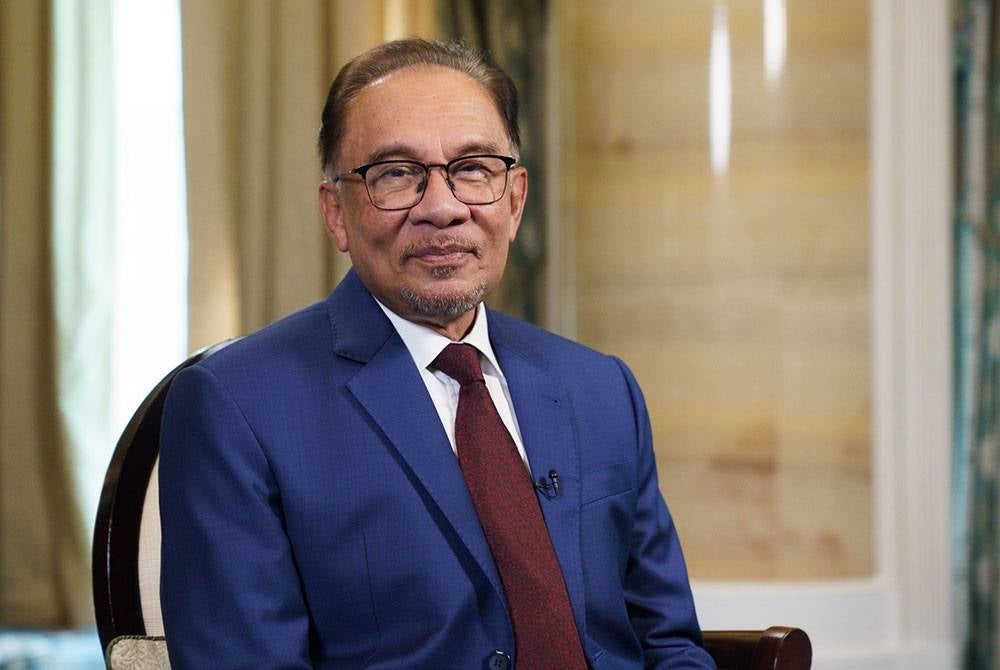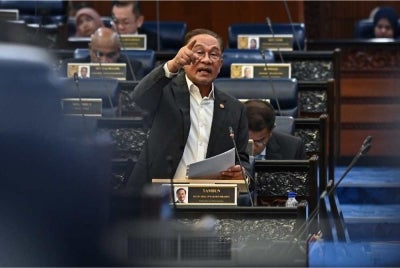Budget 2024: Anwar's fresh start, without the past but towards turbulent future
ZAIDI AZMI KOUSALYA SELVAM
SHAH ALAM – It may not mark his first time tabling a supply bill, but tomorrow's Budget 2024 will be Prime Minister Datuk Seri Anwar Ibrahim's inaugural national financial proposal that is untethered from the shadows and echoes of past administrations.
As critics had found his revision of Budget 2023 lacking in originality, many will now anticipate Anwar's debut budget as a true fresh start, unburdened and untinged with the thinking of the previous administration led former prime minister Datuk Seri Ismail Sabri Yaakob.
Be that as it may, the world’s financial weather looked rather gloomy with the International Monetary Fund (IMF) forecasting that the global economic growth will slow-down to 2.9 per cent compared to last year’s 3 per cent.
“I am not convinced that the IMF forecast here is reliable,” objected Professor Dr Rajah Rasiah of Universiti Malaya’s Asia-Europe Institute.
Rajah argued so because IMF was proven to be wrong on a number of occasions.
“Because its macroeconomic variables tend to be based on long term trends, which is why it got its Malaysian projections in 2021, 2022 and 2023 terribly wrong,” Rajah explained, backing his contention.
While global economic growth might be rather dreary, local economists were convinced that the fundamentals of the Malaysian economy were still in pretty good shape.
“The average economic growth measured by GDP growth for 2023 is about 4 per cent, the average inflation rate is about 3.5 per cent, the unemployment rate is 3.5 per cent,” Dr K. Kuperan Viswanatham noted.
“The current account balance is 3.2 per cent of GDP, interest rates are hovering around 4 per cent. These are all very good and healthy figures,” he remarked, ending his list of the positive signs of the Malaysian economy.
However, Kuperan from Universiti Utara Malaysia, pointed out that the only two indicators that were showing red were: budget balance which stood at 5 per cent; and the exchange rate against USD$ at 5.4 per cent.
But the negative budget balance has been pretty much a common trend experience by almost every single country in the world.
According to Kuperan this was due to high government subsidies and welfare support payments over the last three years to help overcome the economic downturn borne of the Covid-19 pandemic.
As for the USD$ exchange rate, he believed this was Washington’s way of attracting funds into attracting funds into the United States’ economy.
“The USA is suffering from a very high borrowing and debts.
“It is trying to use interest rates to shore up its economy, but the rising of the dollar is a temporary phenomenon and will not hurt Malaysia’s economy very much as we are a net exporter of goods and services
“Also, this is something that USA cannot continue to do as higher interest rates reduces economic growth, consumer spending and private investments, thus harming their economy in the long run,” Kuperan argued.
Nonetheless, times are indeed tough and trying. So, something’s gotta give.
And Universiti Malaya’s Dr Datin Izlin Ismail mooted that subsidies might be cut.
“Going forward, I foresee that subsidies will be rationalised hence a good indication that a bigger percentage might be allocation for development expenditure to spur economic growth next year,” Izlin predicted.
In the revised Budget 2023, Anwar’s administration allocated RM289.1 billion for operating expenditure, RM99 billion for development expenditure and RM2 billion for contingency savings.
In regard to ministerial allocations, there have been a resounding call for more funds to be allotted the Agriculture and Food Security Ministry given the recent local rice shortage triggered by export restrictions by major rice trading countries.
And on the issue of food security, Izlin believed that targeted subsidy was needed to ensure a higher degree of self-sufficiency of domestic basic foods.
“The old agricultural policies are no longer suitable. The sector’s productivity needs to be improved with proper technology application which requires not just funding support from the government but also technical support to ensure correct implementation.
“More competition within the supply chain should be introduced to lower prices and provide more choices to consumers. Changes in prices paid by end consumers should be fed to producers so that they will be incentivised.
“Also, our policies has to shift from focusing mainly on commodities such as palm oil and rubber in order to give emphasis to food security,” Izlin explained.
Rajah was also on the same page with Izlin on how Budget 2024 should provide a much-needed change so as to beef up the country’s food security.
He believed that there must be more effective action plans to raise Malaysia’s food self-sufficiency level (SSL).
“The allocation needs to address coordination between intensive farmers, including small farmer with small plots of land, training, inputs, fertilisers and digitisation of technology.
“I am hoping that the budget goes beyond blueprints and sloganeering so that it can finally address the chronic food trade imbalance that started in 1990 and is still growing,” said Rajah.
Download Sinar Daily application.Click Here!














